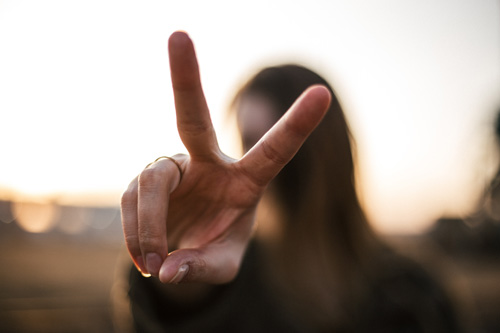“Tough times don’t last – tough people do.” Repeat this as often as necessary in the coming days and weeks as the world begins to grapple with the harsh reality of COVID-19.
Tibetan philosophy says: “Tragedy should serve as a source of strength.” My grandmother kept repeating this line to me when I was growing up. Every time I dealt with an unexpected fight, she kindly reminded me that it helped me grow as long as I was willing to open my mind to it. Over the years I have learned how right she was and how relevant her wisdom is to all of us right now.
Remember that the mind is our biggest battlefield. This is where the conflict is greatest. And with COVID-19 attracting so much attention, we have to keep ourselves in check now more than ever.
In the game of life, we all get a unique set of unexpected constraints and variables on the field. The question is: how will you react to the hand you received? You can either focus on the lack or empower yourself to play the game sensibly and imaginatively to get the best out of every outcome, even if it’s heartbreaking and hard to accept.
With the COVID-19 virus currently spreading rapidly around the world, we are all facing a difficult reality. In an uncertain moment we are on the threshold of an apparently historical event. And while human life is the main concern, it’s also wise to consider the effects it can have on your mental health – to prepare yourself mentally and emotionally.
Think better in difficult times
Thinking better means learning to respond effectively. If you cannot control what is happening in the world around you, you have to challenge yourself to control how you react to what is happening. Because here is your strength!
Of course, that’s easier said than done for all of us.
So let’s practice together.
We can do hard things!
We can make better decisions …
We can choose how to spend our time in the coming days and weeks. We can choose gratitude and grace. We can choose with whom we make contacts – and perhaps more importantly, with whom we do not make contacts (social distancing). We can choose to love and appreciate people in our lives just as they are. We can also choose to love and appreciate ourselves. We can decide how we respond to life’s surprises and struggles (COVID-19 is one of them) and whether we consider them curses or opportunities for personal growth.
And perhaps most importantly, we can choose to think better about our current circumstances and let go of what we cannot control so that we can consciously make the best of what lies ahead.
When we think better, we live better and peace becomes us.
Now let’s not just try to be “positive”. Let’s not try to fake it. Instead, let’s just open our minds to the unknowns in front of us. Here’s how:
- Facilitate immediate resistance.
(Note: This is an excerpt from our New York Times bestseller “Getting Back to Happy”.)
You may be surprised at how often you subconsciously resist life.
If you now assess your body and posture, you can definitely see a kind of tension. For me it is often on my neck, but sometimes on my back and shoulders.
Where does this tension come from that we feel? We resist something – maybe we are annoyed with someone, we are frustrated with life, overwhelmed by all our obligations, or just bored. And our mental resistance creates tension in our body and unhappiness in our life. That is why Marc and I often recommend this simple strategy to our students who are struggling to free themselves from their resistance and tension:
Now look for the tension in your body.
Be aware of what you are resisting and what you are trying to do – it may be a situation or person you are dealing with or you are avoiding.
Relax the tense area of your body – deep breath and quick stretching often help.
Face the same situation or person, but with a relaxed body and mind.
Repeat this exercise as often as necessary today. Face the day with less excitement and more presence. Change your way of being from struggle and resistance to peace and acceptance.
- Find your beginner’s mind.
(Note: This is an excerpt from the latest issue of 1,000 Little Things.)
Imagine having a ripe, juicy tangerine on the table in front of you. They eagerly pick it up, take a bite, and start trying it.
You already know what a ripe, juicy tangerine should taste like, and if it is a little tighter than expected, make a face, feel disappointed and swallow it, feel cheated by the expected experience.
Or maybe the tangerine tastes quite normal – nothing special at all. So you swallow it without pausing to appreciate its taste as you move on to the next unworthy bite and the next.
In the first scenario, the tangerine let you down because it didn’t meet your expectations. In the second case, it was too clear because it met your expectations for a T.
Do you see the irony here?
It is either not good or not good enough. So many of us live our lives. . . unhappy and unsuccessful. That’s why so many of us feel disappointed, disappointed, and excited about almost everything.
Because nothing really meets our expectations.
Imagine trying this instead: remove your expectations of how the tangerine should taste. You don’t know and don’t expect it because you haven’t even tried it. Instead, you are really curious, impartial, and open to a variety of possible flavors. They taste it and really pay attention to it. You’ll notice the juiciness, the texture of the pulp, the spicy, sour and sweet flavors that swirl around your tongue at the same time, and all the other complex sensations that occur in your conscious mind when chewing. You didn’t know what this tangerine would taste like, but now you find that it is different from the others and is remarkable in its own way. It’s a whole new experience – a rewarding experience – because you’ve never tried this tangerine.
Mindfulness experts often refer to this as a “beginner’s mind,” but it’s actually just the result of a mindset that is free from unnecessary, suffocating expectations.
The tangerine can of course replace almost everything in your life: every event, every situation, every relationship, every person, every thought that comes to your mind. If you approach one of these topics with the expectation of how it should or how it should be to be good enough for you, you will almost always be disappointed in some way or too simple and not exciting to do it at all notice. And you will just move on to the next disappointment or unworthy life experience and to the next and the next and so on and so on until you’ve barely liked or hardly noticed most of your life in an endless cycle of experiences.
A moment of opportunity for us
The bottom line is that every conceivable situation has a hidden beauty when we are ready to open up to it. For example, in the past, when Marc and I coped with the death of loved ones, we discovered ways for us to appreciate life more, to appreciate the lives of those we lost, and to appreciate the priceless time we had with our loved ones.
We do our best to embody the same mindset in every difficult life situation we find ourselves in. When we get sick, we have the opportunity to rest. When an unpredictable event – like COVID-19 – shifts one of our business projects, we spend more time with the family. When our son Mac causes a tantrum, we see that he expresses himself, maintains his individuality and is human.
We choose to find beauty even when it is buried in struggle and pain. And you can do that in the coming days and weeks as well.
Again we can practice together.
This is really a momentary opportunity for us.
The floor is yours …
Please leave a comment below and let us know:
Which point above received the most response?
Is there anything else to tell about COVID-19 or your current circumstances?
Marc and I would like to hear from YOU. ?
Our podcast, THINK BETTER, LIVE BETTER (yes, it’s the title of our annual live event) can also be used as a tool to keep your mindset on the ground while you distance yourself socially, etc. You can listen to the whole thing first Season – 30 episodes – on your favorite podcast player (M&A on Apple Podcasts, Spotify and Google Podcasts).








